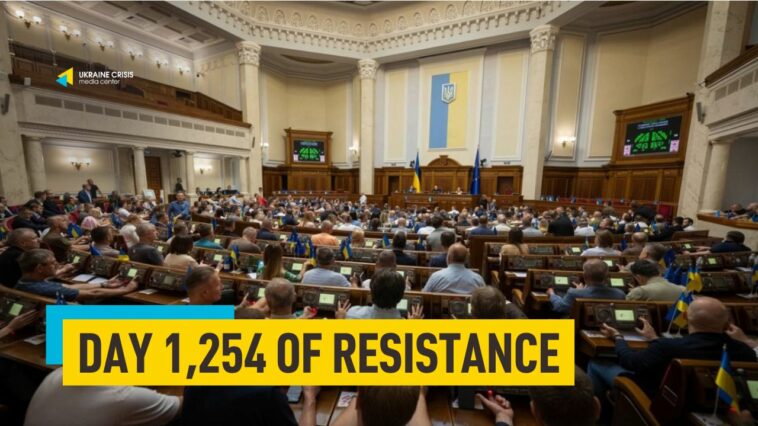Russia’s missile, drone attack kills 16 in Kyiv. Ukraine’s parliament restores independence to anti-corruption agencies. U.S. hits Iran’s oil-trading network with most sweeping sanctions in seven years
Russia’s missile, drone attack kills 16 in Kyiv
Russia carried out a major missile and drone attack on Kyiv overnight into Thursday, killing at least 16 people, including two children, and wounding 155 others. A missile destroyed part of an apartment block in the Svyatoshynskyi district. A six-year-old boy and a 17-year-old child were among the dead. At least 16 children sustained injuries.
Ukraine’s Air Force said Russia had launched 309 drones and eight Iskander-K cruise missiles toward the country. The air defenses shot down or otherwise neutralized 288 and three missiles. The main target for the attack was Kyiv.
Five Russian missiles and 21 drones hit target in 12 locations, and debris from missiles and drones fell in 19 sites, it added.
The missiles flew at low altitudes, head of the Communications Directorate for Ukraine’s Air Force Command, Colonel Yuriy Ihnat said on national television on Thursday.
“All missiles are dangerous. [Air defenses] intercept some missiles with higher efficiency, and others with lesser success. Kyiv was attacked today with Iskander-K ground-launched cruise missiles. Russia frequently uses them in the attacks alongside Kh-101 and Kalibr missiles. They belong to the same class, but there are nuances in their interception,” Ihant said.
Russia launched the missiles from the region of Kursk.
“There’s quite a little time to detect [the missiles] and respond [to the threat],” he said.
Russia is using low altitudes, riverbeds and terrain, Ihnat explained. “The missiles fly close to earth’s surface, and it becomes hard for our defenses to detect them. It’s not the first time that the enemy uses missiles in the attack. Today, air defenses destroyed three of eight missiles launched at Kyiv,” he added.
Ukraine’s parliament restores independence to anti-corruption agencies
Ukraine’s parliament on Thursday passed a bill presented by President Volodymyr Zelenskyi that restores the independence of the National Anti-Corruption Bureau (NABU) and the Specialized Anti-Corruption Prosecutor’s Office (SAPO).
A total of 331 lawmakers voted in favor of the bill.
The MPs also supported the initiative that called for the bill’s immediate signing by the head of the parliament, Ruslan Stefanchuk, and its further submission to the president.
Stefanchuk signed the bill after the vote. It will come into effect after the president signs it into law and as soon as it’s published in the Holos Ukrayiny (Voice of Ukraine) newspaper.
The parliament meeting was livestreamed for the first time since the invasion.
People rallied outside the parliament building on Thursday demanding that lawmakers restore the independence of anti-graft agencies.
U.S. hits Iran’s oil-trading network with most sweeping sanctions in seven years
The U.S. Treasury Department announced on Wednesday what it said was Washington’s most significant Iran-related sanctions action since 2018.
The measures target more than 50 individuals and entities, and 50 vessels connected to Mohammad Hossein Shamkhani, son of a top political adviser to Iran’s Supreme leader Ali Khamenei.
The Treasury Department said that Shamkhani operates a massive fleet of tankers and containerships. The network transports oil and other cargo from Iran and Russia, “generating tens of billions of dollars in profit.” Shamkhani leverages corruption through his father’s political influence at the highest levels of the Iranian regime and uses obfuscation tactics with dozens of entities in multiple countries, ranging from the United Arab Emirates to Cyprus to Panama to Hong Kong, to hide the beneficiaries.
The sanctioned entities are involved in illicit oil exports, arms sales, shipping of dual-use goods and money laundering.
“The Shamkhani family further exploits their ill-gotten wealth to obtain access to benefits unavailable to everyday Iranians, including owning exclusive properties around the world and obtaining foreign passports in exchange for substantial financial investments,” the U.S. Treasury Department said.
Explaining the new actions, Deputy Treasury Secretary Michael Faulkender, cited by Politico, said the sanctions were aimed at driving down Iranian oil exports as part of a campaign to squeeze Tehran amid ongoing concerns about its nuclear program, ballistic missile activities and support for terror groups.
The European Union sanctioned Shamkhani earlier in July, citing his role in the Russian oil trade.
According to Bloomberg, Shamkhani owns an oil empire that secures most of the exports of Iranian and Russian crude oil. He is behind the Milavous Group Ltd. registered in Dubai that manages a network of firms. Since its inception in 2022, the company has raked in billions of dollars in sales from commodities originating out of Iran, Russia and elsewhere.
Milavous through its entities relies on blending and rebranding crude along with various petroleum products from Iran and Russia in third jurisdictions.
In an emailed response to Bloomberg’s questions, Milavous Managing Director Mohamed AlHashmi said the firm has no connection with Shamkhani while a lawyer representing the company said it follows all rules and has no links with any Russian or Iranian interests. Shamkhani also said he neither founded, owns or has any role in the management of Milavous.
“I am not involved in the commodity industry as Bloomberg suggests,” Shamkhani said in an emailed statement sent by his lawyer, noting that he is primarily engaged in logistics. “As for my business, I operate in countries not under sanctions.”
A Bloomberg News investigation in December last year showed how Shamkhani had managed to embed himself in the heart of the Western financial system to handle weapons deliveries across the Caspian Sea to Russia, helping Moscow in its war in Ukraine.




